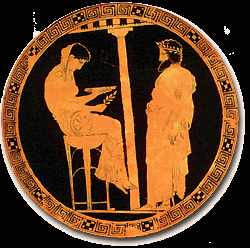Seers (Mantis) played a very important role in Greek society. There were two main types of Mantis. The first type was stationary and worked in temples as oracles. A prime example of this type of Mantis can be seen at the Temple of Apollo at Delphi, also known as the Oracle of Delphi, and Apollo's personal Mantis, the Pythia. These seers often were appointed to office for life and were supported by sacrifices brought to the temple by petitioners. Certain cuts of meat from the animals given by worshippers would go to the Mantis, as would the pelt of the animal, which could be sold in the local markets. Seers of this type were highly profitable for local towns, because if the oracles was popular enough, then tourism it brought would bring a great deal of traffic to local merchants. These types of seers were often talked up in how accurate and powerful they were, as to heighten the popularity, and hopefully bring more petitioners.
“Nor was it only priests who made out well...local hotels and taverns had a steady trade in housing and feeding visitors. Those who sold the animals to be sacrificed and , merchants who sold small objects for people to dedicate to the God benefited too.” (p.35, Johnston)
These Seers also could claim direct, divine inspiration from the Gods, often through means such as vapors, or a mirror lowered into a well of water. Many of the sites where the Oracles were founded often had “creation myths,” in which a God would give a sign that a temple was to be built there and that it was a spot that was good for oracular activities. This aspect of the Oracles might be why most political decisions were made with advice obtained from these seers, and military campaigns often did not begin without at lease one consultation with the Oracles.
The second type of seer often traveled from town to town. These seers would offer palm readings, augury (ornithoskopoi), spirit possession consultation, dream interpretation (oneirokritai), and many other forms of divination and spell work. These independent seers often interpreted omens for small charges, and were often accused of being charlatans. Many operated on the edges of society, and did not hold the high respect and prestige that the seers of the temples did. Despite all this, these seers were fairly common and seemed to move through society with little trouble.
“Begging priests and manteis go to the doors of the rich and convince them that by means of sacrifices and incantations they have accumulated a wealth of power from the Gods, which enables them to cure any injustice committed by a person or his ancestors through pleasant festivals. Moreover, if anyone wants to harm an enemy, either justly or unjustly, he will be enabled to do so for a small cost, since priests and manteis are master spells to invoke ghosts and spells to bind people...” (Plato, Republic 364b5-365a3)
Many of traveling seers would claim descent from Apollo, or from a long line of seers. “We must be careful, however not to leap to the conclusion that the Greeks always understood divinatory talents to be what we would nowadays call “genetically determined.” That is, although such talents might sometimes be viewed as inheritable...they could also be viewed as skills that a parent taught to a child.”(p. 110, Johnston) The seers also often belonged to guilds which traced their founding back to other famous seers. “Sometimes, the guilds are better known than their mythic founders...Often, even when the guild of a mantis is mentioned, a full family pedigree is given as well.” (p.110, Johnston)
One place where the traveling Mantis held great importance was on the battle field. While the stationary Oracle would be consulted before starting a war campaign, the battle field Mantis would be consulted as to timing for attacks. Alexander the Great often consulted his mantis, Aristander, before battle.
Both types of seer seemed to play an important role in society. There was a bit of competition between the two groups, but both found niches that allowed them to coexist peacefully.
Sources:
“Ancient Greek Divination,” by Sarah Iles Johnston. Wiley-Blackwell Press (2008).
“The Republic,” by Plato as translated by Desmond Lee. Penguin Books (2003).
“The Seer in Ancient Greece, by Michael Attyah Flower. University of California Press (2009).



 RSS Feed
RSS Feed
